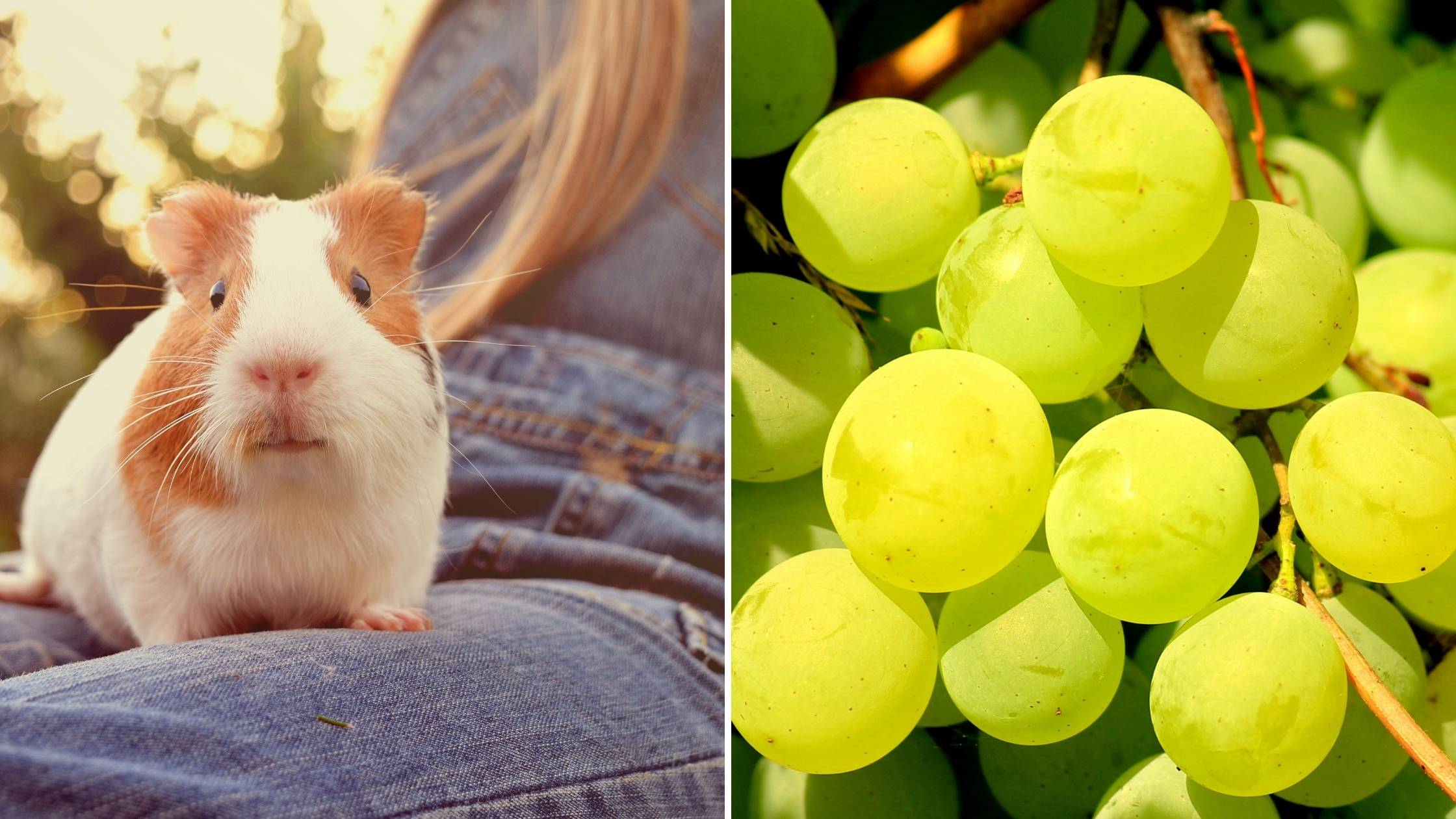Guinea pigs need a lot of nutrients in their diets to stay healthy and happy. In most cases, this means the more variety you can give them, the better. However, their digestive systems are very different to humans, so you need to be careful.
A popular food that guinea pig owners often want to feed their pets is grapes. So, can guinea pigs eat grapes, and what are the key considerations? Let’s find out.
Can Guinea Pigs Eat Grapes?
Yes, guinea pigs can eat grapes. Grapes contain a lot of nutrients like vitamin C that are great for guinea pigs. However, grapes should still be treated like candy, and grapes cannot be a regular treat for guinea pigs. Additionally, guinea pigs should eat grapes without seeds.
Grapes are fairly nutrient-dense, but they can also cause obesity and digestive problems in guinea pigs if they eat too much. Therefore, feeding guinea pigs grapes in moderation is ok, but guinea pig owners should not overdo it. They should only be given to supplement their normal guinea pig food and hay
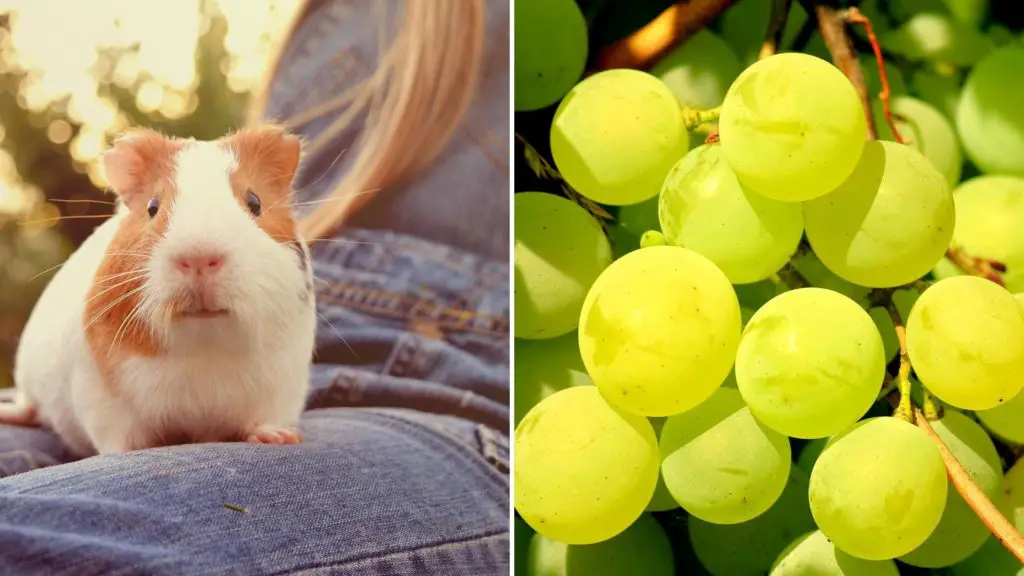
What Are The Benefits of Grapes for Guinea Pigs?
Grapes contain a lot of vitamins that benefit guinea pigs. For instance, grapes contain a good amount of vitamin C, which is crucial to a guinea pig’s health. Guinea pigs cannot store or synthesize vitamin C, so they need to consume vitamin C to avoid a vitamin C deficiency. Vitamin C deficiencies can cause abnormal and cartilage formation, which can make their joints painfully swell. Vitamin C also helps raise nitric oxide levels, which can lower a guinea pig’s blood pressure and improve energy levels.
Guinea pigs need a fair amount of vitamin A to stay healthy, which is found in grapes. Vitamin A helps guinea pigs maintain healthy vision, growth, and reproduction. If a guinea pig has vitamin A deficiency, it can lead to poor growth, weight loss, inflamed eyelids, bacterial infections, etc. Hence why guinea pigs need vitamin A in their diets to be healthy.
Grapes also have vitamin B-6. While vitamin B-6 is not a common deficiency in guinea pigs, vitamin B-6 deficiencies can lead to convulsions and folic acid deficiency. So, grapes can be a great way to avoid those issues.
Grapes contain calcium that can keep your guinea pig healthy. Calcium is an important part of a guinea pig’s diet because it aids their development and keeps their bones strong. Additionally, guinea pigs spend a lot of their lives chewing, so calcium can help keep their teeth strong.
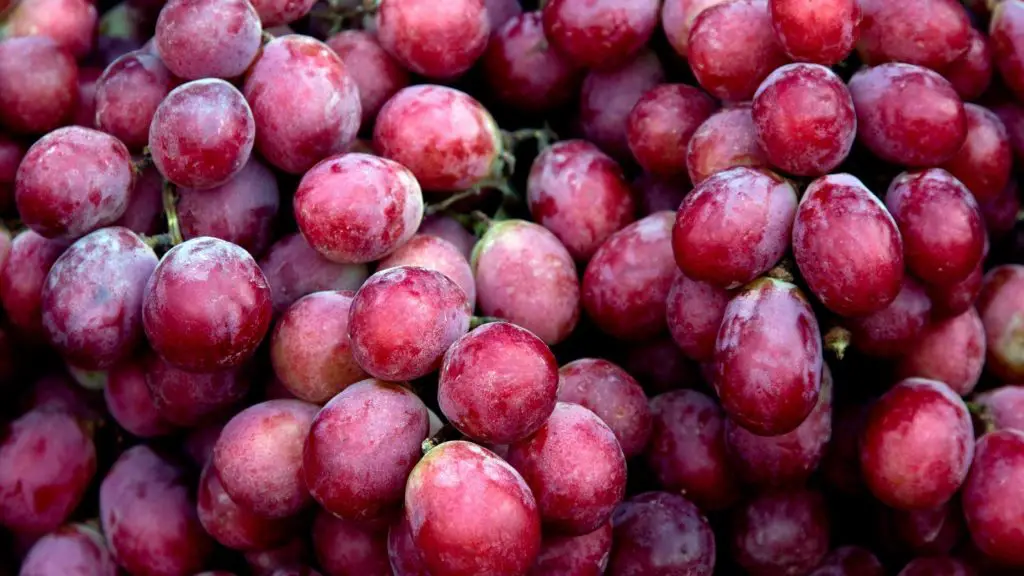
Grapes also contain phosphorus and potassium. Phosphorus is an essential mineral that helps form new teeth and bones in a guinea pig’s body. Potassium can help prevent bladder and kidney stones in guinea pigs, which is common in guinea pigs.
Grapes also have a lot of antioxidants that can prevent diseases in guinea pigs. Antioxidants help keep a guinea pig’s immune system strong, which can help ward off disease. Plus, antioxidants help flush toxins out of a guinea pig’s system to keep the guinea pig healthy.
Grapes have magnesium that guinea pigs need to have stronger bones to avoid injury. Magnesium also helps guinea pigs with learning and improve their moods. Additionally, magnesium can reduce tension and anxiety by relaxing the muscles, helping guinea pig’s get a better night’s sleep. Plus, it helps improve testosterone production.
Grapes contain iron that help make red blood cells, which is crucial for healthy guinea pigs. Furthermore, iron can boost your guinea pig’s energy. Iron enhances the delivery of oxygen throughout a guinea pig’s body. So, better blood circulation means that a guinea pig would be less lethargic.
What Are the Side Effects of Grapes for Guinea Pigs
Grapes have a high sugar content, and too much sugar and are bad for guinea pigs. Sugar is the primary cause of disease in guinea pigs, which include obesity, abdominal pain, etc. Guinea pigs are much smaller than humans, so they can react badly to what looks like a small amount of sugar to people. Therefore, it would be easy to give a guinea pig too much sugar by accident, which can easily happen with grapes. Treating grapes like candy can prevent overdoing a guinea pig’s sugar intake.
Overweight guinea pigs should not eat grapes. Grapes are like candy to guinea pigs because they are high in sugar and do not offer as much nutrients as their normal foods. Giving an overweight guinea pig sugar can make their sugar levels fluctuate and make it difficult for them to lose weight.
Calcium is beneficial for baby guinea pigs, but adult guinea pigs do not need that much calcium. However, too much calcium can cause bladder stones. That is why many guinea pig owners look for hay that is low in calcium to prevent bladder stones in guinea pigs. Bladder stones are painful, and they can make it hard for a guinea pig to urinate, causing dangerous symptoms like bloody urine. In some cases, guinea pigs need surgery to remove the bladder stones.
As mentioned earlier, grapes contain phosphorus which can benefit guinea pigs. However, excessive amounts of phosphorus can cause weak growth and metastatic calcification. These are long-term issues that would make guinea pig’s lives difficult.
While grapes do contain vitamins and minerals that are great for a guinea pig, it is not nutrient dense. Grapes do not contain a significant amount of these nutrients to meet a guinea pig’s daily needs. It would take a lot of grapes to reach the nutritional requirement of guinea pigs, and a guinea pig would not and ought not to eat that many grapes. Therefore, it would be best to still have a variety of foods in a guinea pig’s diet with grapes as an occasional treat.
On very rare occasions, grapes can be a choking hazard to guinea pigs. Luckily, pet owners can avoid this by removing the seeds and chopping the grapes to quarters before serving it to their guinea pigs.
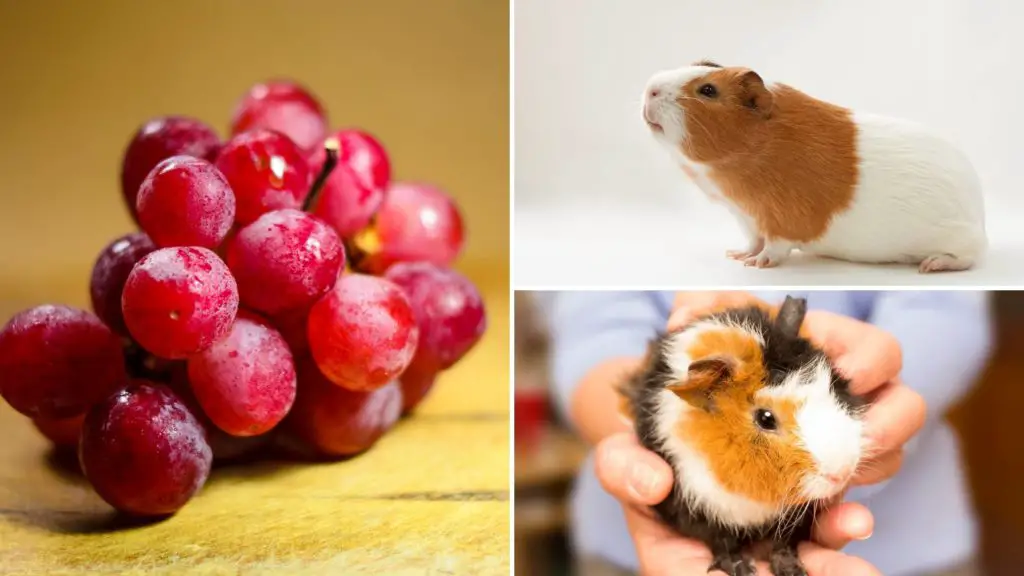
How Many Grapes Can a Guinea Pig Eat?
Most healthy guinea pigs can eat 1-2 grapes. The grapes should be medium-sized. If the grape is large, the guinea pig can eat 1 large grape. Guinea pigs can eat 1-2 grapes only once a week. Do not overdo it with the grapes because it is easy to overfeed guinea pig grapes.
However, guinea pig owners should consider how much sugar their guinea pigs ate that week. For instance, other fruits like strawberries and apples contain sugar. If the guinea pig already ate a strawberry that week, it would be best to calculate how much sugar they already ate that week before giving grapes to them. To stay on the safe side, guinea pig owners can skip giving their pets grapes that week.
If this is the first time the guinea pig eats grapes, be sure to give a small amount first. Pet owners can give guinea pigs half a grape at first to see how they react. If there are any adverse reactions, it would be best to find a different treat for the guinea pig. Common fruits for guinea pigs like apples and strawberries are more nutrient-dense, and would be a better treat for guinea pigs.
Some side effects to look out for in guinea pigs after they eat grapes include:
- Loose stool
- Diarrhea
- Digestive discomfort
- Decreased appetite
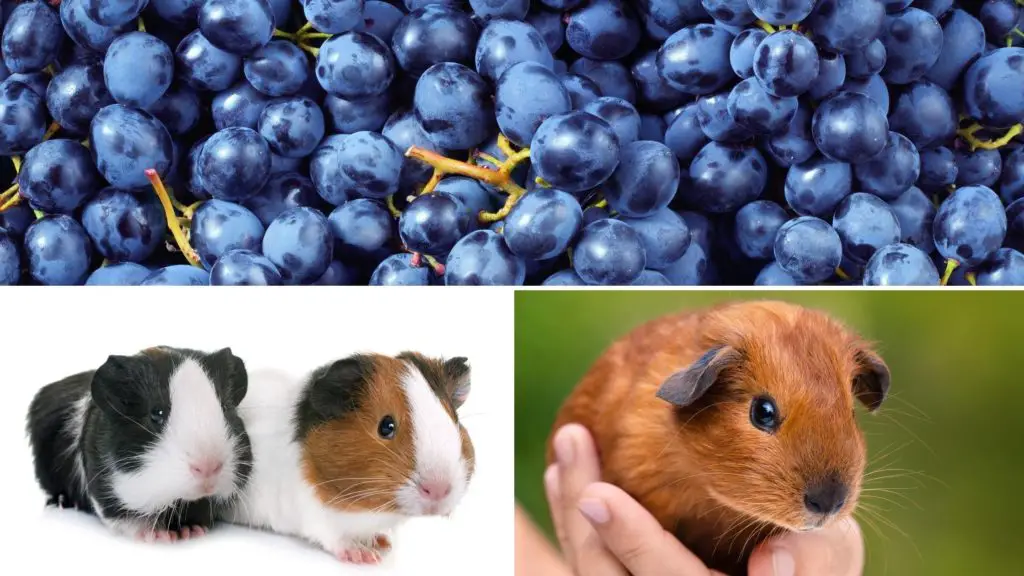
What Kind of Grapes Can Guinea Pigs Eat?
Guinea pigs can eat any kind of fresh grape. However, each kind of grape contains different sugar levels and nutrients. For instance, green grapes have the most sugar, while red and purple grapes have less sugar and more antioxidants.
When choosing grapes for guinea pigs, it would be best to carefully examine the grape and buy grapes from reputable farmers. Grapes that contain microorganisms or parasites can enter a guinea pig’s body and make them sick.
Guinea pig owners should never give their pets dried grapes. Dried grapes are raisins, which means they are concentrated grapes. The concentration raises the sugar levels to about 72%, whereas a regular, fresh grape only contains about 16% sugar. Therefore, it would be best to never give dried grapes/raisins to guinea pigs.
Can Guinea Pigs Eat Grape Seeds?
It is not good to let guinea pigs eat grape seeds. Guinea pigs have sensitive bodies and digestive systems, and they will not be able to easily pass a grape seed like a human would. Therefore, it could make it for your guinea pig to defecate.
Additionally, grape seeds are a choking hazard to guinea pigs. While the seeds seem small to humans, guinea pigs are much smaller than people. Therefore, grape seeds can easily get stuck in a guinea pig’s throat. It would be best to remove the seeds before feeding it to a guinea pig. Alternately, pet owners can buy seedless grapes.
Can a Guinea Pig Eat Grape Leaves?
It would not be ideal to feed grape leaves or grapevines to guinea pigs. There is no research to support whether grapevines and grape leaves are ok for guinea pigs. However, guinea pigs have very sensitive bodies that can easily react to the wrong food. Therefore, it would be best to never give guinea pigs grape leaves.
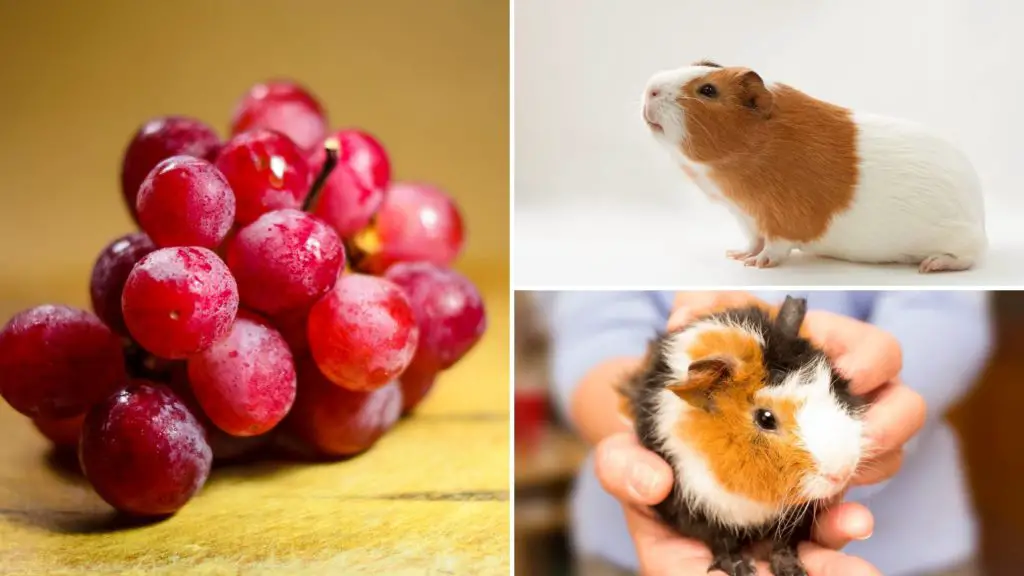
Can Baby Guinea Pigs Eat Grapes?
Similar to giving an adult guinea pig grapes for the first time, pet owners should slowly introduce grapes to baby guinea pigs. A quarter of a small to medium grape should be fine to test the waters. If your guinea pig has no adverse reactions, you can give a baby guinea pig a quarter or half a slice of a grape every 1-2 weeks. However, it would be best to offer baby guinea pigs more veggies and less sugary fruits.
How To Feed Guinea Pigs Grapes
Firstly, select fresh and ripe grapes to give to the guinea pig. To feed guinea pig grapes, thoroughly clean the grape skin or peel off the skin to remove any chemicals or pesticides on the fruit. Next, slice the grape in half and remove seeds if there are any. Slice the grape into quarters to make it easier for the guinea pig to eat.
All in All
Grapes are a great treat to give to guinea pigs because they contain some beneficial vitamins and minerals to keep them healthy. However, grapes have a lot of sugar, so guinea pigs can only eat grapes in moderation. Grapes should also only be given to healthy guinea pigs.
References:
- Sawnee Animal Clinic, ‘Vitamin C Deficiency (“Scurvy ”) in Guinea Pigs’, https://sawneeanimalclinic.com/downloads/vitamin_c_deficiency_scurvy_in_guinea_pigs.pdf, Accessed – 7 May 2021
- NCBI, ‘Nutrient Requirements of Laboratory Animals: Fourth Revised Edition, 1995.’, https://www.ncbi.nlm.nih.gov/books/NBK231932/, Accessed – 7 May 2021
- Vetlexicon, ‘Vitamin B’, https://www.vetstream.com/treat/exotis/guinea-pigs/generics/vitamin-b, Accessed – 7 May 2021
- Lamond Veterinary Clinic, ‘WHY DO GUINEA PIGS NEED A SPECIAL DIET?’, https://lamondvet.co.uk/why-do-guinea-pigs-need-a-special-diet, Accessed – 7 May 2021
- Science Direct, ‘Benign Tumors and Tumor-like Lesions of the Lung’, https://www.sciencedirect.com/topics/medicine-and-dentistry/metastatic-calcification, Accessed – 7 May 2021

